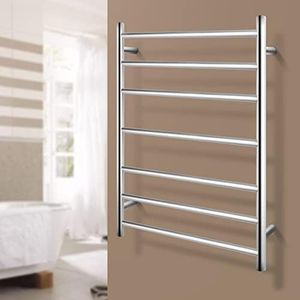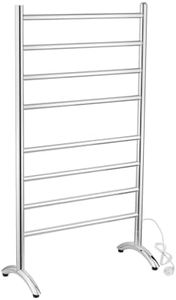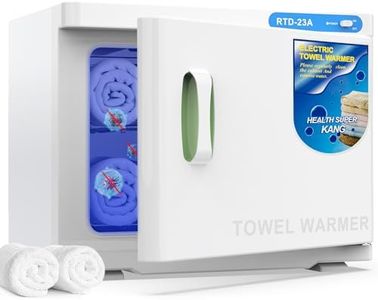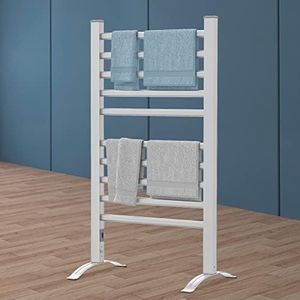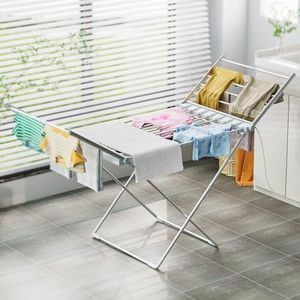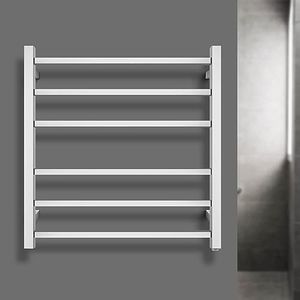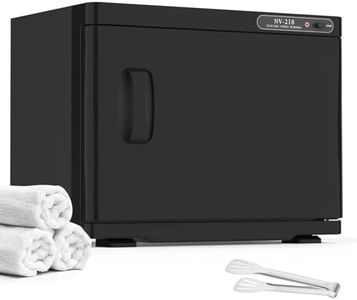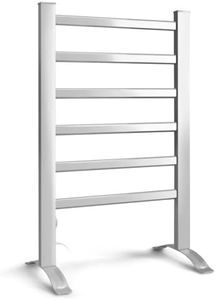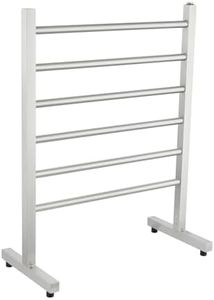We Use CookiesWe use cookies to enhance the security, performance,
functionality and for analytical and promotional activities. By continuing to browse this site you
are agreeing to our privacy policy
10 Best Towel Warmers
From leading brands and best sellers available on the web.By clicking on a link to a third party's website, log data is shared with that third party.
Buying Guide for the Best Towel Warmers
Towel warmers are becoming a popular addition to many bathrooms, adding comfort and a touch of luxury by keeping your towels warm and dry. When picking a towel warmer, it can be easy to focus just on the looks, but understanding the key features will help you choose a product that best matches your needs and usage style. It’s important to consider where and how you want to use your towel warmer, the size of your household, and what installation options are available in your space.Type (Electric vs. Hydronic)The type of towel warmer refers to how it heats up: electric or hydronic. Electric towel warmers plug into a standard outlet or can be hardwired, making them easy to install in most homes. Hydronic towel warmers are connected to your hot water heating system, making them more efficient if you already have radiator-style heating. For most homes without complex renovations, an electric model is often more versatile and simpler. If you already have hydronic heating and want to integrate the warmer into that system, a hydronic warmer might be right, but this usually requires more involved installation.
Size and CapacitySize and capacity refer to how many towels you can fit on the warmer at one time and how much wall or floor space the unit will occupy. Small warmers are perfect for individuals or guest bathrooms, holding one or two towels. Medium units handle typical family usage with room for several towels, while large units or those designed for larger households, spas, or busy bathrooms can dry and warm many towels at once. Measure your available space carefully and consider how many towels you want to warm regularly to pick the right size for your needs.
Mounting Style (Wall-Mounted vs. Freestanding)Mounting style refers to how the towel warmer is placed in your space. Wall-mounted models save floor space and have a sleek appearance, making them ideal for smaller bathrooms where space is tight. Freestanding towel warmers offer more flexibility since you can move them around as needed and don't require permanent installation. Pick wall-mounted if you want a permanent, out-of-the-way solution, or freestanding if you need flexibility and may want to move the warmer to different rooms.
Heating SpeedHeating speed is about how quickly the warmer brings towels to a comfortable temperature. Some units warm up in under 15 minutes, while others might take half an hour or more. Fast-heating models are useful if you want to grab a warm towel on short notice, while slower units are fine if you can turn them on ahead of use. Consider your daily routine: if you tend to forget to switch devices on early, a fast-warming model can be more convenient.
Material and FinishThe material and finish of a towel warmer affect both durability and style. Stainless steel is popular because it resists rust and corrosion, making it ideal for the humid environment of a bathroom. Other materials like chrome or powder-coated metals provide different looks, but may require more maintenance. Pick the material and finish that matches your bathroom decor, but also think about how easily it will stay clean and resist damage from moisture over time.
Energy EfficiencyEnergy efficiency indicates how much electricity (or hot water, for hydronic models) a towel warmer uses. More efficient models warm towels using less power, which is better for the environment and saves on utility bills over time. If you plan to run your towel warmer often or leave it on for extended periods, look for a model that is specifically labeled as energy efficient or comes with features like timers or thermostats to avoid unnecessary power usage.
Safety FeaturesSafety features ensure that the towel warmer doesn't become a hazard in your home. Look for overheat protection, timers, and automatic shut-off functions, especially in households with children or pets. If you expect to leave the warmer on unattended or want extra peace of mind, these features can be especially important.



